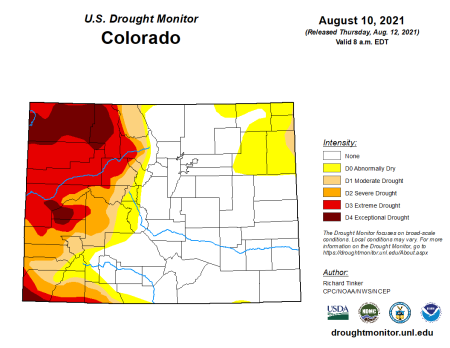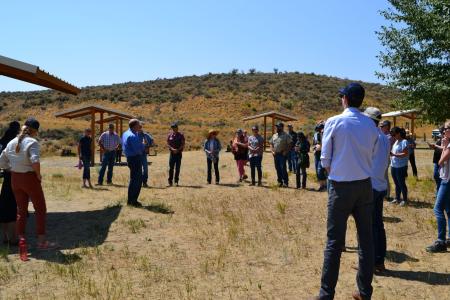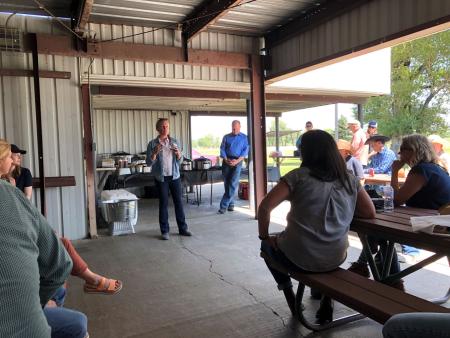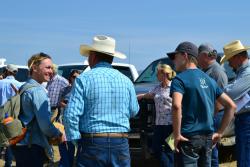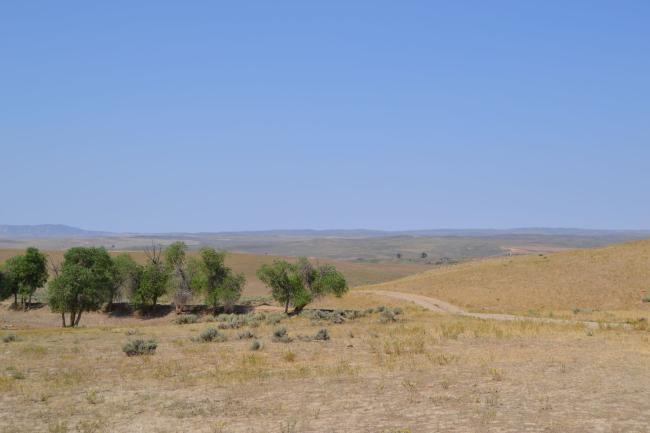By Bethany Howell
On August 11 and 12, the Colorado Drought Task Force organized a Drought Tour through northwest Colorado in the Yampa River Basin to speak with producers, natural resource managers, local legislators, and other community members about the impacts of an ongoing drought in the region. The tour was geared towards helping legislators and other key policy makers understand the impacts of prolonged drought on Colorado’s northwest region (Routt and Moffat counties) and recognize how its effects impact all of Colorado.
Normally, the Yampa is one of the most consistent weather areas of Colorado, with seasonal precipitation occurring with comforting regularity. But these past few years have been anything but “normal,” and the Yampa River basin is feeling the upswings in temperature this year more than any other part of Colorado.
When the Front Range and the Eastern Plains received welcome winter snowstorms, the snowpack on the Western Slope remained thin. When spring and summer rains visited much needed moisture on the San Luis Valley, the Southwest, the Front Range, and Eastern Plains, the Western Slope was dry. The repercussions of these weather patterns became clear during two days of discussions on the Drought Tour.&
Telling stories of heartbreak were producers like Mike Camblin, a Moffat county rancher and owner in the Maybell Ditch Company. Camblin and many of his neighbors culled entire herds of cattle after scarce forage in their usual mountain grazing pastures drove them back down from the hills, only to have high hay prices prevent purchasing additional fodder. Camblin and other producers are being forced to make tough decisions about whether to keep their herds alive by selling them away. Others in the same predicament spoke about hauling water to cattle and sheep months earlier than usual, and running out of water to haul that much sooner. In the early August heat, the pastures were empty. Their stories serve as a reminder that agricultural producers across Colorado are sharing the same anguish.
In between visits to producers, tour participants learned from water experts about the complex web of drought. In addition to livestock struggling to eat and crops only producing enough for one cutting, depleted soil moisture levels absorb almost every drop of precipitation, which means snowmelt runoff doesn’t have a chance to make an appreciable difference to the river basins. Administering disappearing surface water flows becomes an intolerable balancing act between senior and junior water rights, leaving everyone unsatisfied. These combined effects paint a stark reality: even with an above average snowpack, such as the state saw in 2018, one year of plenty isn’t enough to undo seasons of scarcity. Arid soil, thirsty plants, and chronically dehydrated forests exacerbate an already untenable situation.
The tour’s speakers also pointed out opportunities for addressing impacts through meaningful collaboration and increased resilience. Over the past several months:
- Water district managers from the Colorado River District and Yampa Water Conservancy negotiated timed releases from reservoirs like Elkhead and Stagecoach to offset irrigation deficits.&
- Forest managers from the Colorado State University Forest Service and the USFS work together in “Good Neighbor” agreements to thin timber, clear deadfall, and enhance watershed health by planting riparian vegetation.
- Public water officials are preparing secondary water sources to ensure water quality and quantity are still available, because the aftermath of last summer’s devastating wildfires is a likely problem in their near future. They are also working with forest managers to identify and mitigate problem areas.
With the approval of $76 million in agricultural stimulus funds, the Colorado Department of Agriculture offers a path towards resilience that directly benefits producers across the state. While some stimulus funding is dedicated to dealing with the effects of the COVID-19 pandemic on the ag community, CDA is also in the process of rolling out several programs to help address current and future drought conditions:
- Drought Resiliency: $1.5 million will be available in competitive grants for projects on drought, wildfire response, or planning & technical assistance. Applications for the grants will open on September 1, 2021. Another $1.5 million has also been appropriated by the legislature for additional research and drought programs.
- Soil Health: Grants are available to Conservation Districts and other eligible entities (including Tribes, grower associations, individual producers and others), who work to implement soil health practices. Applications are now open.
- Energy Efficiency: $3 million in grants is available through the voluntary ACRE3 program (Advancing Colorado’s Renewable Energy and Energy Efficiency), which helps ag producers with on-farm renewable energy and energy efficiency projects. Applications are open now on a rolling basis.
While the end of the tour marked the end of another dry summer, the reality of drought remains ever present throughout each season and in every major river basin of Colorado. There is no part of a watershed that is left untouched by drought. Not the rivers or streams, not the land, not the wildlife, not the trees, and certainly not the people. Those who make their living off the land are impacted first and most heavily, but urban communities will not remain unscathed for long.
The Colorado Drought Task Force, which organized the 2021 Drought Tour, is co-chaired by Colorado Water Conservation Board, Colorado Department of Agriculture, and Colorado State University Water Center. Participating in the tour were State leaders including Governor Jared Polis, Commissioner of Agriculture Kate Greenberg, Executive Director of the Division of Natural Resources Dan Gibbs, Congresswoman Lauren Boebert, State Representatives Karen McCormick, Barbara McLachlan, Susan Lontine, and Dylan Roberts, in addition to county commissioners, state directors, water managers, and others.
